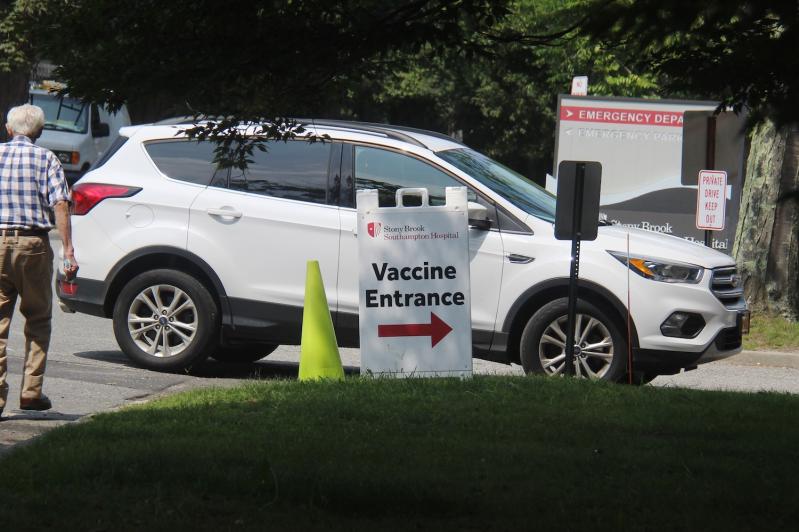While new recommendations released last week on Covid-19 booster shots for at-risk populations are not a broad suggestion that all vaccinated people get a booster, they do extend the recommendation to a great many people.
Last Thursday the Centers for Disease Control’s Advisory Committee on Immunization Practices and the federal Food and Drug Administration signed off on an update of the booster recommendations.
For those who received the Johnson and Johnson vaccine, the recommendations are most straightforward: Anyone 18 or older who was vaccinated two or more months ago should get a booster.
And now, people who completed their Pfizer or Moderna mRNA vaccine series more than six months ago are eligible for a booster provided they are: 65 or older, 18 or older and live in a long-term setting, 18 and older with certain medical conditions that put them at risk of severe Covid-19, or 18 or older and work or live in high-risk settings.
As in the past, the qualifying medical conditions include but are not limited to active cancer, chronic kidney disease, chronic lung disease like moderate to severe asthma or chronic obstructive pulmonary disease (among others), dementia, diabetes, heart failure, coronary artery disease, high blood pressure, H.I.V., depression, schizophrenia, being overweight or obese, smoking, having received an organ or stem cell transplant, and/or having had a stroke. A full list of conditions that would qualify people for a booster can be found on the C.D.C.’s website.
People working in high risk settings would include health care workers, firefighters, police, teachers, daycare workers, food and agriculture workers, corrections workers, public transit workers, and grocery store workers, among others, with an emphasis on those who come into contact with high volumes of people whose Covid-19 status may be unknown and/or those who work in settings where their occupation involves active care of Covid-19 patients.�
These recommendations come on the heels of accumulating data showing that, to varying degrees, protective immunity against Covid-19 wanes over time for all three of the available vaccines here in the United States, and that additional vaccination with a booster shot provides a significant increase in antibody protection, which subsequently continues to provide remarkable protection against severe illness and even death from Covid-19.
And, of key importance, studies of the booster vaccinations show that side effects, while still possible after receiving a third dose, remain acceptably low. Safety data out of Israel after around 2.8 million doses of a third Pfizer vaccination earlier this year showed that systemic, local, neurologic, allergic, and other reactions were substantially lower after the third dose than after the first or second, although there may have been some underreporting in this regard, per the C.D.C.
However, there was an increased rate of swollen lymph nodes in the phase 3 Pfizer trial looking at booster doses, with a rate of about 5.2 percent compared to .4 percent after the primary series completion. So it is important that people keep this in mind and know that it remains a possibility, although there does not appear to be any long-term harm associated with this, and it likely reflects an expected and natural immune response to increased antibody production. Otherwise, side effects remain similar to those seen previously: fever, soreness at the injection site, muscle aches and pains, and fatigue, among others, that are self-limited and generally resolve within a few days.
Finally, the F.D.A. also authorized the use of the much-vaunted “mix-and-match” approach to booster shots, wherein vaccinated individuals seeking a booster shot no longer have to receive a booster shot from the same maker as their primary one. This reflects several reported studies, such as those suggesting that recipients of the Johnson and Johnson vaccine may have a notably improved immune response if their subsequent dose is one of the mRNA vaccines, and reports that there were no safety concerns seen in individuals who received a combination of Pfizer and Moderna vaccines. A number of outlets have reported that the C.D.C. is expected to provide additional guidance regarding this mixing and matching strategy in the coming weeks.
So what does this mean for you? If you fall into one of the at-risk categories above, then the time has come to receive a booster dose, and these can be obtained generally at some of the larger chain pharmacies like CVS or at by appointment at Stony Brook Southampton Hospital, bit.ly/2Po8DrZ. If you are interested in mixing and matching types of vaccine, that option is now available to you, but if you want to wait until more data is released, then the strong recommendation is to find an appointment for a booster dose of the one you already got because while Covid cases are currently on the downward slope in the United States, there have been recurrent rises time and time again.
And as many have said from the beginning of the vaccination effort, the shot that you can get — and are comfortable getting — is the one you should get.
—
Joshua Potter, D.O., a physician with Stony Brook Southampton Hospital’s Meeting House Lane Medical Practice, oversees the practice’s Shelter Island office. He specializes in family and neuromusculoskeletal medicine. Opinions expressed in this column are his personal and professional views and not necessarily those of his employer.

